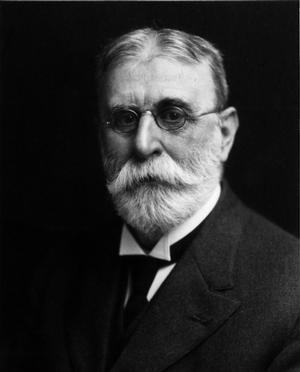"Law and Gospel" -- B. B. Warfield's Review of C. F. W. Walther's Book
 Wednesday, April 25, 2018 at 01:37PM
Wednesday, April 25, 2018 at 01:37PM  B. B. Warfield (1851-1921) is widely hailed as one of America's greatest theologians. His books have remained in near-continuous publication since his death in February, 1921. Although dead for nearly 100 years, Warfield remains a theological force with which to be reckoned.
B. B. Warfield (1851-1921) is widely hailed as one of America's greatest theologians. His books have remained in near-continuous publication since his death in February, 1921. Although dead for nearly 100 years, Warfield remains a theological force with which to be reckoned.
As professor of polemical and didactic theology at Princeton Theological Seminary, Warfield published 781 book reviews over his long and exceedingly productive career.
Some of Warfield's reviews are published in his collected works, while many are not. I thought it might be of interest to bring some of these currently unpublished "Reviews" to light.
I'll offer my own annotations when I think a comment is necessary or interesting.
The first review discussed in this series was Children in the Hands of the Arminians. The second review is Warfield's review of the German born Lutheran theologian, C. F. W. Walther's book, Gesetz und Evangelium (Law and Gospel). The book was first published by Concordia in 1893, and Warfield gave it a brief review the following year. Walther's book remains in print and can be found here: C. F. W. Walther on Law and Gospel
___________________________________
Warfield describes the format behind Walther's book, noting that Walther had given a series of lectures on Friday evenings to theological students. These lectures were then transcribed into thirty-nine chapters, corresponding to Walther's lectures with each centering around a particular thesis, then discussed in detail. Warfield seems to appreciate the lively content produced by such a "live" audience.
Besides his academic lectures, Dr. Walther was, it seems, accustomed to give to the whole body of students, assembled usually on a Friday evening, series of freer talks on theological and practical topics. Among these was a course of twenty-two talks on “Inspiration;” one of twenty-two talks on “The Truth of the Christian Religion;” one of forty-nine talks on “Justification;” one of sixty-two talks on “Election and Justification;” and (among still others) two courses, one of ten and the other of thirty-nine talks, on “The Law and the Gospel.” The Introduction to each talk, the citations used in it, and the plan of treatment, exist in Dr. Walther’s own hand; for the rest full stenographic notes of his students are available. From this material, it is proposed to publish the whole of them in due time; and the present book, which contains the shorter course on “The Law and the Gospel,” makes the beginning.
Warfield also appreciates the clarity found in Dr. Walther's exposition of confessional Lutheran doctrine, along with the importance of the getting the distinction between law and gospel right.
Like all that Dr. Walther wrote, these talks are characterized by accuracy of statement, thoroughness of theological knowledge, and entire devotion to confessional Lutheranism; and they have in addition much of the fire and freedom of the extemporary address. The thirteen theses [note: the current edition lists twenty-five theses] on which they are based recognize the importance and difficulty of rightly distinguishing between the law and the gospel; and point out some prevalent modes of conception by which the distinction is confused.
Warfield notes Walther's usefulness in discussing how law and gospel are often confused along with the serious consequences which result when they are. He agrees with Walther in that confusing the two leads to a number of errors, especially when the gospel is understood or presented in the form of an imperative--as though the gospel is something we do, not doctrine (Christ's saving work and merits) we embrace through faith.
For example, the confusion between law and gospel, made by papists, Socinians and rationalists, in making the gospel itself a doctrine of works, is deservedly scored; men are warned not to mix the gospel with the law, or the law with the gospel, but to preach the law in its full strictness, and the gospel in its full sweetness; they are warned not to reverse their places, but to preach the law first and the gospel second; not to tell the awakened sinner to work out a peace for himself before he comes to the gospel, and the like.
Warfield whole-heartedly agrees with Dr. Walther on this and obviously sees his Lutheran counter-part as a sort of theological first cousin. Yet, the Reformed understanding of law and gospel which are better understood as a subset of traditional Reformed covenant theology, and along with maintaining the Reformed doctrine of the perseverance of the saints (which Walther rejects in this volume) reminds us that significant differences do remain between the confessional Reformed and our confessional Lutheran cousins.
Warfield very much likes the spirit of Walther's work, yet issues a mild word of caution to Reformed and Presbyterian readers.
In theses and treatment alike the strictest Lutheranism reigns, and Calvinists will find something to modify; but through all, the spirit of the man of God throbs. We hope the other series of talks will be speedily published; and we venture to express the wish that the series on “Inspiration” may be next given to us; the times demand it.
Warfield, who, like Walther, was fighting against the rising tide of German higher criticism in the churches and seminaries, eagerly awaits Walther's contribution to the battle. On challenges to the inspiration of Scripture, Warfield and Walther can stand shoulder to shoulder.
Warfield's review can be found in The Presbyterian and Reformed Review 5, no. 17–20 (1894).
 Kim Riddlebarger
Kim Riddlebarger
My good friend and compatriot Andrew Compton sent along a pdf of Warfield's original review in the Presbyterian and Reformed Review.
You can find it here: Warfield's "Review" of C. F. W Walther's Law and Gospel


Reader Comments